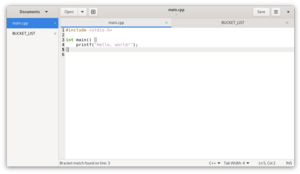gedit (/ˈdʒɛdɪt/ or /ˈɡɛdɪt/)[3] is a text editor designed for the GNOME desktop environment. It was GNOME's default text editor and part of the GNOME Core Applications until GNOME version 42 in March 2022, which changed the default text editor to GNOME Text Editor.[4] Designed as a general-purpose text editor, gedit emphasizes simplicity and ease of use, with a clean and simple GUI, according to the philosophy of the GNOME project.[5] It includes tools for editing source code and structured text such as markup languages.[5]
 | |
 gedit 46.1 showing "Hello, world!" with syntax highlighting and one other tab | |
| Developer(s) | Paolo Maggi Paolo Borelli Steve Frécinaux Jesse van den Kieboom James Willcox Chema Celorio Federico Mena Quintero[citation needed] |
|---|---|
| Initial release | February 12, 1999 |
| Stable release | 46.1[1] |
| Preview release | 43.alpha[2] |
| Repository | |
| Written in | C, Python |
| Platform | Linux, MacOS |
| Type | Text editor |
| License | GPL-2.0-or-later |
| Website | gedit-technology |
It is free and open-source software under the GNU General Public License version 2 or later.[5]
gedit is also available for macOS and at one time had a Windows version, which as of May 2020 was no longer available.[6][7]
By July 2017, gedit was not being maintained by any developers, but in August 2017 two developers volunteered to commence work on it again.[8][9][10]
Features
editgedit includes syntax highlighting via GtkSourceView[11] for various program code and text markup formats including MediaWiki.[12][13] gedit also has GUI tabs for editing multiple files. Tabs can be moved between various windows by the user. It can edit remote files using GVfs libraries; (GnomeVFS is now deprecated). It supports a full undo and redo system, search and replace as well as replace all.[14] Other typical code oriented features include line numbering, bracket matching, text wrapping, current line highlighting, automatic indentation and automatic file backup.[14]
The features of gedit include multi language spell checking via Enchant and a flexible plugin system allowing the addition of new features, for example snippets and integration with external applications including a Python or Bash terminal.[14] A number of plugins are included in gedit itself, with more plugins in the gedit-plugins package and online.[15]
Since version 3.20 gedit uses gspell for spell checking.[16][17]
gedit has an optional side pane displaying the list of open files and (in a different tab of the side pane) a file browser. It also has an optional bottom pane with a Python console and (using gedit-plugins) terminal. gedit automatically detects when an open file is modified on disk by another application and offers to reload that file. Using a plugin (in gedit-plugins package), gedit can save and load sessions, which are lists of currently open tabs.[15]
gedit supports printing, including print preview and printing to PostScript and PDF files. Printing options include text font, and page size, orientation, margins, optional printing of page headers and line numbers, as well as syntax highlighting.[18]
In late 2013 and early 2014 the application received major upgrades for Gnome 3.12, with a new, cleaner user interface and code base improvements to make it work better with other desktop interfaces, such as Unity.[19]
Architecture
editBeing part of the GNOME Core Applications, gedit 3 uses the GTK 3.x and GNOME 3.x libraries. The GNOME integration includes drag and drop to and from GNOME Files.
gedit uses the GNOME help system for documentation. It also uses virtual file system and GNOME printing framework.[20]
In December 2008, gedit binaries were made available for macOS and Windows.[21]
The last version for Windows 32-bit was 2.30.1, released in 2014.[22] Standalone releases for 64-bit Windows continued, with Version 3.20.1 released in 2016.[23]
Current versions of gedit (3.0+) for Windows are also available through MSYS2 and can be installed via the built-in Pacman package manager.[24]
See also
editReferences
edit- ^ "News in 46.1".
- ^ "News in 43.alpha". 6 July 2022.
- ^ Borelli, Paolo (19 April 2006). "Re: [gedit-list] Pronouncing gedit" (Email). GNOME Mail Services. The GNOME Project. Retrieved 25 April 2014.
- ^ "GNOME Release Notes". GNOME.org. Retrieved 26 September 2022.
- ^ a b c The GNOME Project (October 2015). "gedit". Retrieved 14 November 2024.
- ^ "gedit On Windows". wiki.gnome.org. 5 April 2021. Archived from the original on 1 December 2021. Retrieved 1 December 2021.
- ^ "gedit". microsoft.com. 4 May 2020. Archived from the original on 1 December 2021. Retrieved 15 November 2021.
- ^ "[gedit-list] gedit is unmaintained, some thoughts". mail.gnome.org. Retrieved 5 August 2017.
- ^ "Gedit Text Editor is No Longer Maintained - OMG! Ubuntu!". OMG! Ubuntu!. 27 July 2017. Retrieved 2 August 2017.
- ^ The GNOME Project (27 August 2017). "About gedit maintenance". wiki.gnome.org. Retrieved 29 December 2017.
about gedit maintenance: gedit has been marked as unmaintained recently, now two new developers have proposed their help to become new maintainers. If you want to help, reach us on the IRC channel or the mailing list, thanks!
- ^ "Projects/GtkSourceView - GNOME Wiki!". wiki.gnome.org.
- ^ Wikipedia:Text editor support § gedit
- ^ jpfleury. "Syntax highlighting for MediaWiki in gedit". GitHub. Retrieved 21 October 2016.
- ^ a b c "gedit: a powerful, underrated text editor for everybody", Free Software Magazine Archived 2008-05-18 at the Wayback Machine 15 February 2008
- ^ a b "gedit plugins". gitlab.gnome.org. Retrieved 14 November 2024.
- ^ "GNOME / gspell GitLab". gitlab.gnome.org.
- ^ "Blog post: gspell news". Archived from the original on 14 November 2018. Retrieved 23 March 2016.
- ^ "Printing with gedit". Library.gnome.org. 2011. Retrieved 23 February 2020.
- ^ Sneddon, Joey-Elijah (15 January 2014). "Gedit Text Editor Finally Gets a UI Revamp". News Organization. Retrieved 15 January 2014.
- ^ "Free Software Directory - gedit". Directory.fsf.org. 3 October 2005. Retrieved 23 February 2020.
- ^ "Club Silencio » Late Christmas gift for Windows users". Blogs.gnome.org. 25 December 2008. Retrieved 13 March 2009.
- ^ "ftp.gnome.org". ftp.gnome.org. Retrieved 22 March 2019.
- ^ "ftp.gnome.org". ftp.gnome.org. Retrieved 22 March 2019.
- ^ "How to build your GTK+ application on Windows". Blogs.gnome.org. 1 August 2014. Retrieved 30 November 2015.
External links
edit- Media related to Gedit at Wikimedia Commons
- Official website
- Download 32-bit for Windows
- Download 64-bit for Windows